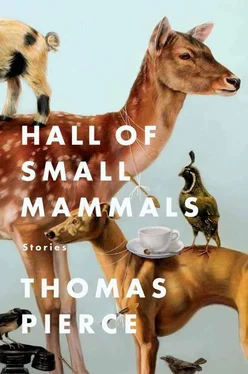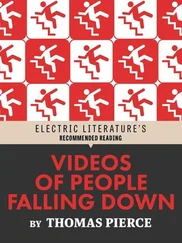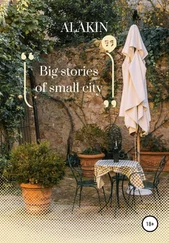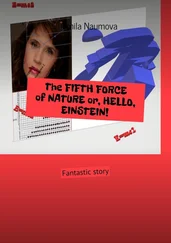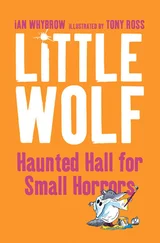Only once she’s on the stairs in her bathrobe and slippers does she remember leaving all the doors open for Shirley. The mammoth isn’t in the laundry room — or anywhere else in the house.
“Come on out, wherever you are. Don’t play tricks on me.”
She steps outside into the sunlight and peeks under the edge of the porch, just in case Shirley managed to squeeze herself underneath. The far corner is where the dog went to be alone in the end. But the mammoth is not there. Nor is it anywhere in the yard or the dog pen. Shirley has escaped.
Of course, there’s no one to call for help but Tommy. His voice mail picks up after a few rings.
“Call me back. It’s about Shirley,” she says vaguely.
As soon as she hangs up, she regrets the message. Her son doesn’t need to be involved, not if his solution is poison-laced candy or a bop on the head with the shovel. An unsettling image begins to take shape: her Tommy, no longer handsome but totally devolved, a swollen caveman’s brow, hunting spear in his grimy hand, bits of broken leaves in his long and matted hair.
She climbs into her car and drives up and down the block, too afraid to actually yell out Shirley’s name. Two streets over she spots a hulking shape beside a brick house, but when she gets closer the shape is only some yellow pampas grass. On a cul-de-sac, a white-haired man in a blue tracksuit is walking his Jack Russell terrier. The sight of the man with his dog, the parallel rhythm of their strides, almost brings a tear to Mawmaw’s eye. When she pulls up alongside the man, he leans down to her open window.
“Something wrong?” he asks.
“Sorry, but you seen anything kind of odd this morning?”
“Like what?”
She’s not sure what to say. “I lost my dog. A real big one.”
“Sorry to hear that. You tried animal control?”
“I will,” she says. “Good idea.”
She drives home again and gets on the phone.
“Listen,” she says, once she has a woman on the line. “Have you gotten any of what’d you say were ‘odd calls’ this morning?”
“Like what?” the woman asks.
“Like, for instance, about a real big and sick hairy dog?”
The woman breathes deep. “Ma’am, are you calling to report a big and hairy sick dog?”
Mawmaw hangs up. She opens a cabinet for breakfast but isn’t very hungry. Next to the cereal boxes is a tub of mixed nuts. Upstairs she flips on the television in her bedroom. She waits for Shirley to show up on the morning news, then the afternoon news, then the evening news.
She goes outside to smoke a menthol, but can’t remember which end is which. The ash flakes on the brick at her feet. She pictures Shirley in the oncoming beams of interstate traffic. She pictures her in a hunter’s crosshairs, then her head stuffed and mounted as a trophy .
She is on her fourth menthol when she hears a car in the driveway. A few minutes later, Tommy comes around the corner of the house, his face gaunt under the porch light. He looks out to the dog pen and seems relieved not to see a mammoth there. If Shirley knows what’s good for her, Mawmaw thinks, she won’t come anywhere near the house tonight, not with Tommy here. She’ll wait until he’s gone again before coming home.
“I was knocking out front,” he says, his hand up to shield his eyes from the light. “Guess I should have called first.”
Mawmaw takes another drag of her menthol. In this light, he is only the outline of a man. “What’s the matter?” he says, stepping toward her. “It’s me.”
He’s been living with her for not quite a year when Claire first mentions Alan Gass.
“I think I need to tell you about something,” she says. “About someone .”
Walker turns down the stereo above the fridge and readies himself for whatever comes next. They are in the kitchen — formerly her kitchen, now their kitchen. The butter crackles around the edges of the potatoes he is frying in a big cast-iron pan. He runs his hand through his dark hair, as if exhausted. If she confesses an affair, what will he do? First, switch off the burner. Second, grab his jacket and go without a word. The third step could involve fast walking, tears, and possibly a stop at the liquor store. Beyond that, it’s hard to say.
Claire is on the other side of the kitchen island with her laptop open, an old black T-shirt sagging down her left shoulder, a turquoise bra strap exposed. Until now, she’s been quietly at work. She no longer takes classes, but when she did, they had titles like “Advanced Topics in Sub-Subatomic Forces.” Thanks to a graduate fellowship, she spends most days on the top floor of the physics building at the university, thinking about a theoretical particle called the daisy.
The daisy is a candidate for the smallest particle in the universe, but no one has devised a way to observe or prove the existence of one. Doing so would probably require re-creating the conditions of the Big Bang, which everyone seems to agree would be a bad idea. The wider academic community has not fully embraced Daisy Theory, as it’s called. Claire’s advisor came up with it, and, like him, Claire believes the mysterious particle is forever locked in a curious state of existence and nonexistence, sliding back and forth between the two. Daisy Theory has helped put Claire’s physics department on the map.
“I haven’t mentioned him until now because”—she scratches her chin with her chipped electric-blue fingernail—“I was embarrassed, I guess.”
“Just tell me,” he says, wanting this over with quickly.
“All right, here it is. Okay. I’m kind of married.”
“Kind of?” He doesn’t understand. Typically, one is or isn’t married. He races through the possibilities: she’s separated from someone and failed to mention it until now; or rather, she met and married a mysterious man on the sly; or, not a man, but a woman, and what she wants to propose next is an open relationship. No, more likely this is a new and clever update on the same old fight they have about time and priorities. She’s married to her research , and he just needs to get that through his head.
“No, what I mean to say is, sometimes at night, when I dream, I dream I have a husband.”
“A dream marriage,” he says. “Okay.” He kills the burner under the pan and scrapes the potatoes onto the plates where already the green beans have gone cold.
“Tell me what you’re thinking. Does this bother you? You’re not the man in the dream.”
“Just so I’m clear,” he says. “This isn’t you telling me that you’re cheating on me?”
“I’m not cheating on you. Not unless you count dreams as cheating. Do you?”
Walker wonders if this is an elaborate test; if, maybe, he muttered some other woman’s name in his sleep the previous night. Although he sometimes dreams about sex, in the morning the details of his encounters are usually hazy and impressionistic, with floating parts that don’t connect to a specific face. He doesn’t mention this now. A dream marriage, if that’s really what this is about, should probably not bother him. He tells her so.
“So it doesn’t concern you that I’m in love with someone else in my dreams?” she asks.
“You didn’t mention love.”
“Well, I married him, didn’t I?”
“Do I know the guy? Have I met him? Please don’t tell me it’s your advisor.”
Whenever she talks about needing more time for her research, Walker knows, that includes more time alone with her advisor. She reaches across the island for Walker’s hand, a gesture that makes him suspect he’s about to get more bad news.
“It’s not my advisor,” she says. “My husband’s name is Alan Gass.”
Читать дальше
